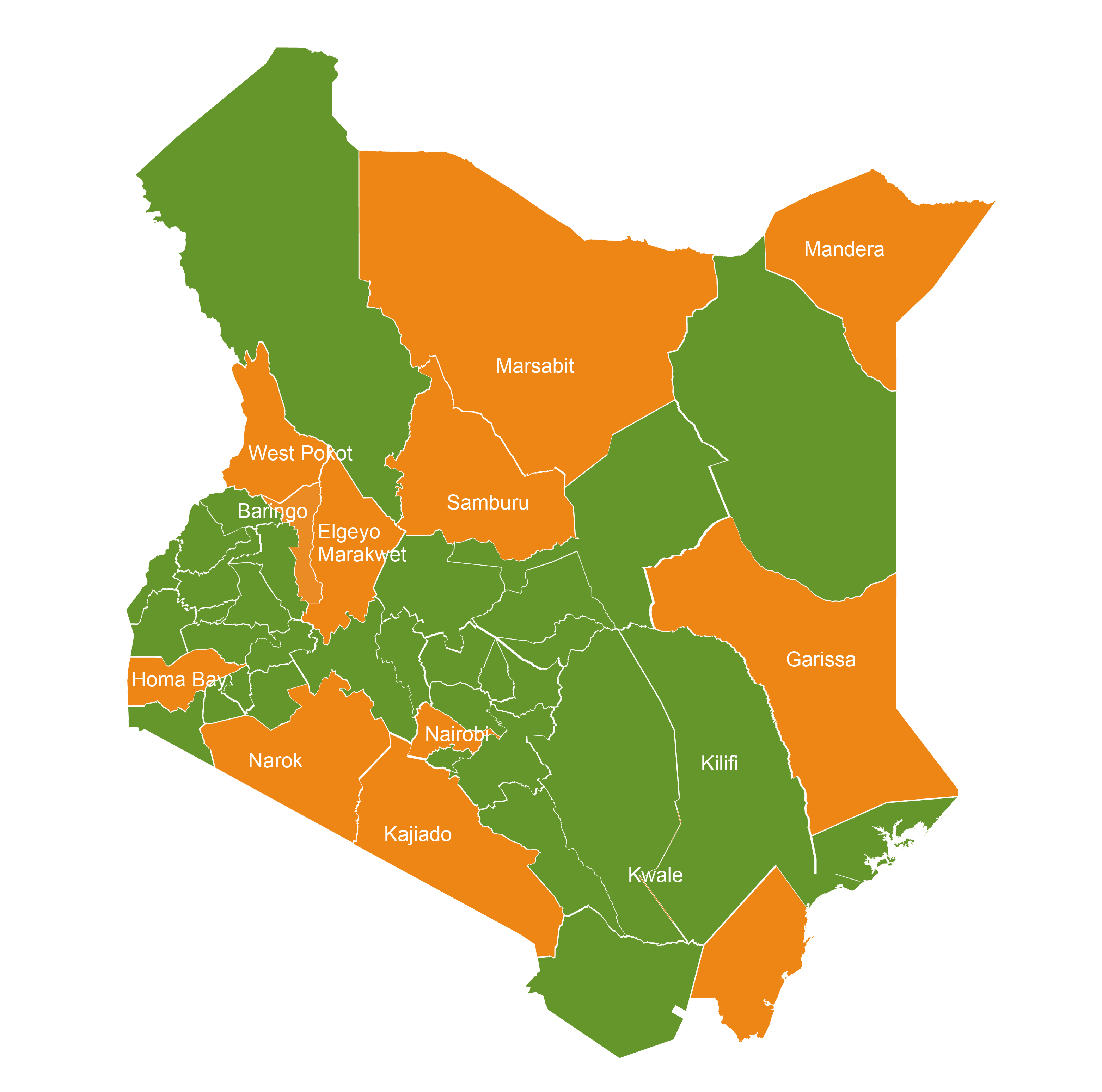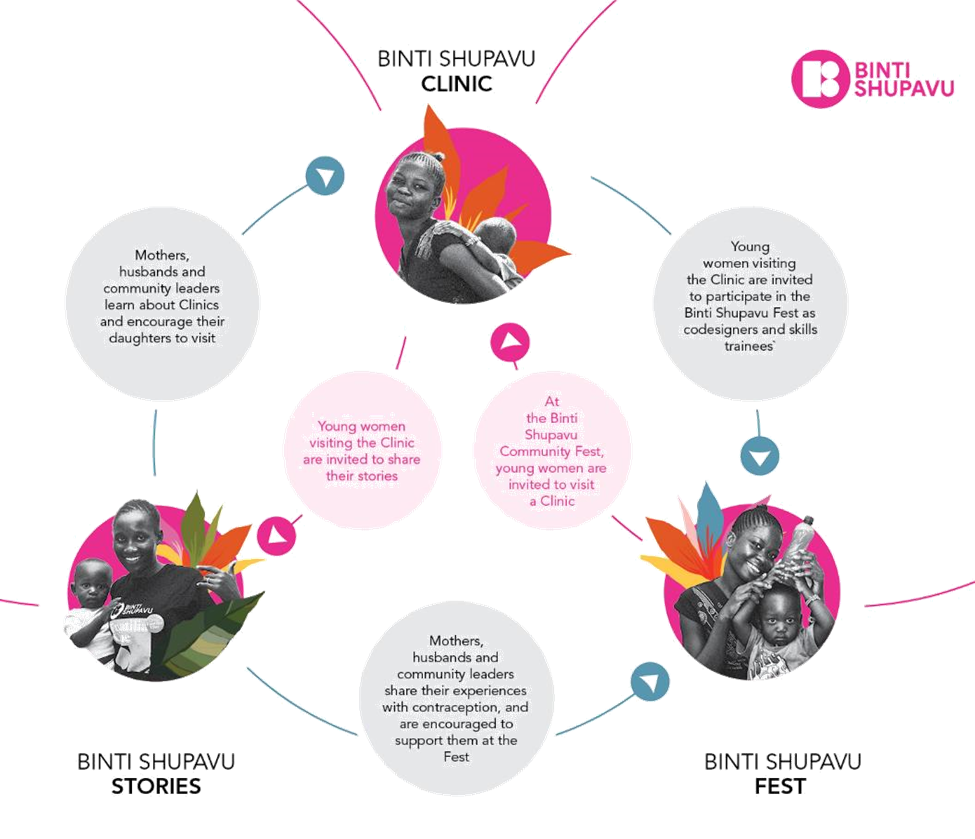PS Kenya employs cutting edge health interventions to address unmet reproductive health needs and disparities across the country to give women and families at large; power to decide when to have children, the number of children and child spacing. The overall goal of our Reproductive Health/Family Planning program is to contribute to the increase of modern Contraceptive Prevalence Rate in Kenya.
National indicators show some progress towards achieving the national targets by the year 2020. However, there still exists high disparities on these indicators with some counties having a very low modern contraceptive prevalence rate and a high unmet need for contraception.
INVESTING IN FAMILY planning is fundamental to achieving Kenya’s health and development goals. When women in developing nations have the ability (access and right to contraception) to space out their pregnancies by at least three years, their babies are twice as likely to reach their first birthday.
There is also evidence of the anti-poverty effects of family planning. For example, women who space out their pregnancies are more likely to advance their education and earn an income to support their families.
The objectives of PS Kenya’s Reproductive Health/Family Planning program include:
PS Kenya reproductive health/family planning target audience
Kenya has been recognized for its strides in increasing its modern contraceptive prevalence rate (mCPR) and satisfying demand, including receiving an EXCELL award in 2015. With such a high modern CPR of 58% we are faced with a twofold challenge; sustaining use among the high CPR counties and increasing use in low CPR counties. Improvements in health outcomes such as an increase in mCPR do mask vast disparities and inequities in access, service provision and quality of care across the country.
There are 9.2 million adolescents and young people aged 15 – 24 years in Kenya. This is close to 20% of Kenya’s total population. This is a Key demography whose health status directly affects the socioeconomic status of the country. Even though we would want this age group to contribute positively in the development of the country, they are instead held back due to poor reproductive health status. Sexual debut is early in teenage life, unprotected sexual activity continues as they transition to adulthood. Their rate of contraceptive use is low translating to high unmet need for contraceptives. PS Kenya has identified this as one of the priority target audience in dire need of specifically tailor made interventions which address their unique needs. This is because addressing their Sexual Reproductive Health (SRH) needs now would significantly improve the current national SRH indicators and guarantee a healthy future generation.

Accelerate- Accelerate is a Sexual and Reproductive Health and Rights (SRHR) and Gender-Based Violence (GBV) program funded by DANIDA and implemented in a consortium led by Population Services Kenya (PS KENYA) in partnership with Gender Violence Recovery Centre (GVRC) and Population Services International (PSI). The program will contribute towards ICPD25 Promise of zero unmet need for contraception, zero preventable maternal deaths and zero gender-based violence and harmful practices hence working towards the three zeros. Accelerate seeks to build on the milestones that Kenya has achieved towards the realization of true universal access to quality sexual and reproductive health services (SRHR), prevention and management of Gender Based Violence (GBV) and reduction in Harmful Traditional Practices (HTPs). The program will focus on 13 underserved, hard-to-reach Counties of West Pokot, Elgeyo Marakwet, Homabay, Kajiado, Kwale, Nairobi, Samburu, Garissa, Mandera, Marsabit, Baringo, Kilifi and Narok. These counties share common challenges mentioned above.
Accelerate Objective and Theory of Change
The Goal of Accelerate-working towards the three zeros is contribute to the reduction in maternal mortality and morbidity, reduce the unmet need for SRHR (including FP) and decrease prevalence of Gender Based Violence (including HTPs). The objective of accelerate is to: a) Increase access and utilization of comprehensive, inclusive and integrated SRHR/ MCH services b) Increase access and utilization of comprehensive, inclusive and integrated GBV response and prevention services c) Strengthen respect for human rights.
The Theory of Change rests on assumption that ultimately, the effort to strengthen women and girls’ human rights, reduce GBV and improve SRHR are linked to prevailing discriminatory socio-cultural norms, attitudes, and beliefs. While legislative and policy reforms have established a basis for gender equality across all sectors, gaps still exist in addressing negative sexual and gender norms at the individual, institutional and societal level to facilitate sustainable and transformatory gender equality changes across Kenya. The underlying assumption is that these socio-cultural norms, attitudes, behavior, and beliefs will be amenable to change once individuals have been exposed to the program interventions that aim at increasing knowledge on human rights, promoting gender quality & prevention of GBV and engaging men and boys to shape their attitudes towards gender equality and foster greater respect for girls and women’s rights.
Outcomes: To accomplish this goal, Accelerate will focus on three outcomes: 1) Increased access and utilization of quality, comprehensive, integrated, equitable and inclusive SRHR/ MCH services for the project’s target audience 2)Increased access and uptake of comprehensive, quality, multi-disciplinary, efficient, equitable, inclusive gender-based violence response and prevention services for GBV survivors; 3)Strengthened respect for human rights to prevent and respond to SGBV including addressing domestic violence, sexual harassment and HTPs 4) Improved knowledge, attitudes, gender & socio-cultural norms and behaviors on Human Rights (women & girls rights)
Outputs: The following outputs will contribute to the outcomes outlined above: 1) Greater availability and access to quality, comprehensive, integrated and inclusive SRHR / MCH services 2: Increased access to quality, multi-disciplinary, efficient, inclusive and user-friendly SGBV response & prevention services; 3: Increased demand for SRHR/ MCH and GBV services; 4: Improved knowledge, attitudes, behaviors, gender and socio-cultural norms on Human Rights; 5: Strengthened national/ county government accountability, capacity, leadership, stewardship and ownership.
Target Groups: Adolescent /youth (girls): Accelerate will target this group so that they have an opportunity to plan their lives without the risk of unplanned pregnancies, GBV and HTPs that infringe on their rights and dignity; Women and girl survivors of GBV; Accelerate will increase their awareness and remove physical, socio-cultural and economic barriers to reporting abuse and accessing services. Boys and men will be engaged to shape their attitudes towards gender equality and to play a bigger role in protecting women and girls’ rights; Poor women, marginalized groups (including LGBT+ & PWDs) and those living in hard-to-reach (including rural) areas who are often left behind in many SRHR and GBV programs.
Link to SDGs: Accelerate will contribute to SDG 1 (no poverty), SDG 3 (good health and well-being), SDG 5 (gender equality), SDG 10 (reduced inequalities), and SDG 16 (peace, justice and strong institutions).
Funded by the Children Investment Fund foundation, A360 Kenya has built on learning from other A360 countries to co-design Binti Shupavu, supported by a global user journey, with and for girls. Binti Shupavu is being implemented in four counties that have low ASRH indicators: Kilifi, Narok, Homa Bay, and Migori.
Binti Shupavu is anchored on key broad strategies geared towards its successful implementation, i.e.,

About Binti Shupavu:
Binti Shupavu is a fresh take on providing information and access to contraception. The program is girl-led and joy-centered, which means that it starts by understanding the spirit of her adolescence and placing her needs first. Our journey towards agency begins at the Binti Shupavu Clinic Sessions which is the core of the intervention and involves service delivery moment which combines a goal setting activity and client-led counseling services. Binti Shupavu Stories engages and educates influencers in the community and those closest to young women so that they can collaboratively address misinformation and support the decisions girls make about their bodies and futures. A sub-set of girls who take part in Binti Shupavu Clinic sessions are supported to progress through a series of six skills sessions, focused on improving girls’ capabilities. This is referred to as Binti Shupavu skills. The Binti Shupavu Fest is a moment for girls and those around them to come together to celebrate the unique contributions of young women within their communities. Girls are also linked after graduating from these fests with TVET, CBOs, or other markets for continued support, experience, and apprenticeships. Through Binti Shupavu, young women have the right information and support to make decisions about their bodies and their futures with confidence.
Target segments
During design, A360 created archetypes of Kenyan adolescent girls. We used these archetypes to decide which segments of girls we were targeting. A360 selected to target married adolescents and unmarried adolescents with children more directly as they presented the greatest opportunity for impact and reach/scale. This does not mean that the intervention doesn’t reach the other segments as well, as anything designed for one of these segments will likely have some resonance for the others.
A360 Kenya sustainability strategy
Informed by the Expand Net framework for sustainable scale as well as the WHO health system building blocks, A360 Kenya’s overarching sustainability objective is: By the end of project A360 will have supported county governments (through targeted technical assistance) to institutionalize, own, resource, and implement Binti Shupavu as an evidence-based model for supporting adolescent contraceptive uptake and continuation.
Delivering Equitable and Sustainable Increases in Family Planning programme, abbreviated DESIP, is a 6-year, UK Aid funded programme focusing on improving Reproductive Health in Kenya with focus on Family Planning in low (<45%) modern contraceptive prevalence rate (mCPR) counties in line with Kenya ‘Vision 2030’. The goal of the programme is to ensure that women and girls can safely plan their pregnancies and improve their SRHR, particularly the young rural, and marginalized, with programme impact contributing to reduced maternal mortality, newborn, and child mortality, and increased mCPR in Kenya.
Find more information on the DESIP programme by clicking on the factsheet below.
About DESIP
Delivering Equitable and Sustainable Increases in Family Planning programme, abbreviated DESIP, is a 6-year, UK Aid funded programme focusing on improving Reproductive Health in Kenya with focus on Family Planning in low (<45%) modern contraceptive prevalence rate (mCPR) counties in line with Kenya ‘Vision 2030’.
Program Period:
June 2019 to March 2025
Geographical Scope
At inception, the programme’s focus was in 19 counties with mCPR below 45% as shown in the s-curve above. Due to funding cuts, the scope was reduced to 12 counties in year three as shown in the map below.
DESIP Videos